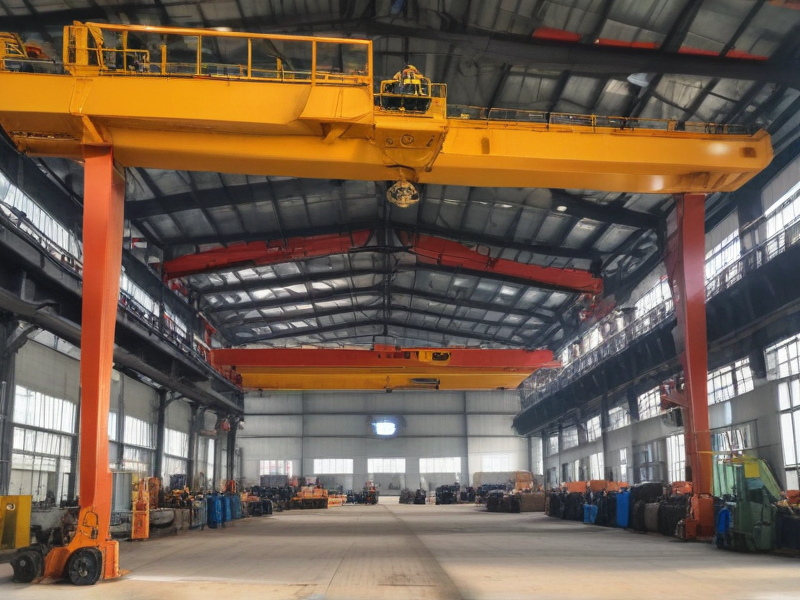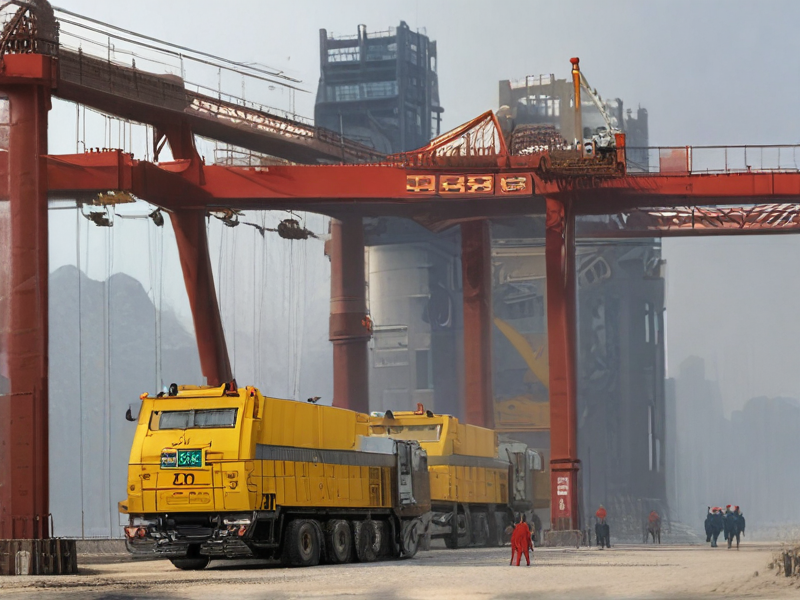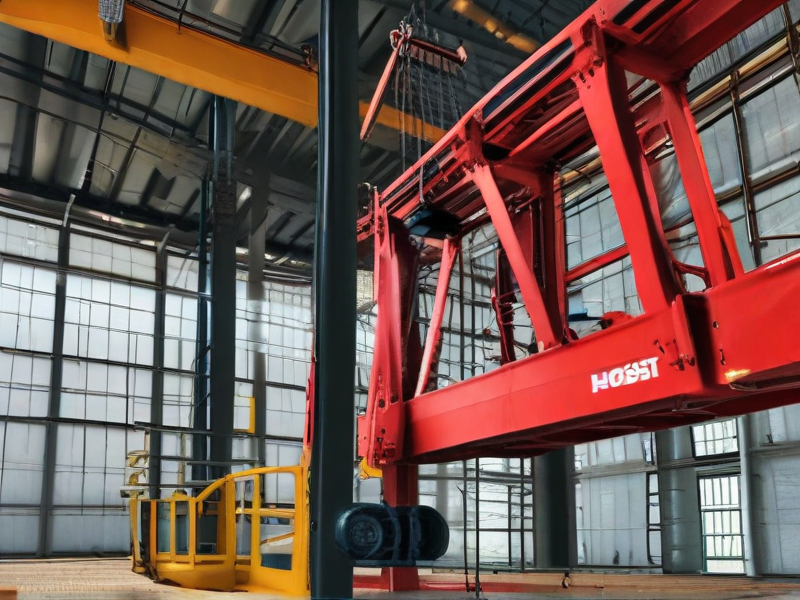Top 10 hoist and crane company in China introduce,list main products and website if have
1. Zhenhua Heavy Industries Co., Ltd (ZPMC)
– Introduction: Specializes in the manufacturing of cranes and large steel structures.
– Main Products: Container cranes, bulk material conveyors, ship loaders/unloaders.
– Website: [en.zpmc.com](http://en.zpmc.com)
2. Sany Group
– Introduction: Renowned for construction machinery alongside hoists and cranes.
– Main Products: Crawler cranes, truck cranes, rough-terrain cranes.
– Website: [sanyglobal.com](http://www.sanyglobal.com)
3. XCMG Group
– Introduction: China’s leading construction machinery company.
– Main Products: Mobile cranes, tower cranes, all-terrain cranes.
– Website: [xcmg.com/en-ap](http://www.xcmg.com/en-ap)
4. Liebherr Machinery (Dalian) Co., Ltd.
– Introduction: A global brand with significant presence in China’s crane market.
– Main Products: Mobile harbor cranes, ship cranes, tower cranes.
– Website: [liebherr.com](http://www.liebherr.com)
5. Zoomlion Heavy Industry Science & Technology Co., Ltd.
– Introduction: Leading manufacturer of construction equipment.
– Main Products: Truck cranes, crawler cranes, tower cranes.
– Website: [en.zoomlion.com](http://en.zoomlion.com)
6. Shanghai Electric Group Co., Ltd.
– Introduction: Major integrated equipment manufacturing enterprise.
– Main Products: Port cranes, shipyard cranes, gantry cranes.
– Website: [shanghai-electric.com](http://www.shanghai-electric.com)
7. Dalian Huarui Heavy Industry Group Co., Ltd. (DHHI)
– Introduction: Specializes in heavy equipment manufacturing.
– Main Products: Ship cranes, port handling equipment, offshore cranes.
– Website: [dhhi.com.cn](http://www.dhhi.com.cn)
8. Henan Weihua Heavy Machinery Co., Ltd.
– Introduction: Focuses on crane manufacturing and services.
– Main Products: Overhead cranes, gantry cranes, electric hoists.
– Website: [weihuacraneglobal.com](http://www.weihuacraneglobal.com)
9. China State Construction Engineering Corporation (CSCEC)
– Introduction: A construction and engineering giant also into crane manufacturing.
– Main Products: Tower cranes, construction hoists.

How to find and select check reliable hoist and crane company in China
Finding and selecting a reliable hoist and crane company in China can be streamlined by following these steps:
1. Research Online:
– Utilize search engines and business directories like Alibaba, Made-in-China, and Global Sources.
– Check company websites for product details, certifications, and experience.
2. Verify Certifications:
– Look for ISO 9001, CE, and other relevant certifications ensuring quality management and safety standards.
3. Check Reviews and References:
– Read customer reviews on platforms like Alibaba and Trustpilot.
– Request customer references from the company and follow up with them.
4. Evaluate Experience and Specialization:
– Opt for companies with a proven track record and specialization in hoist and crane manufacturing.
– Check how long the company has been in business.
5. Assess Communication and Customer Support:
– Ensure the company provides clear, prompt, and professional responses.
– Evaluate their ability to understand and address specific needs.
6. Request Samples and Visit:
– If feasible, request product samples to assess quality.
– Consider visiting the factory or hiring a local inspection service for an on-site visit.
7. Compare Quotes and Terms:
– Obtain detailed quotes from multiple suppliers.
– Compare not only prices but also warranty terms, delivery times, and after-sales service.
By systematically following these steps, you can significantly reduce the risk of partnering with unreliable suppliers and ensure you choose a trustworthy hoist and crane company in China.
Background Research for hoist and crane company in China, use qcc.com archive.org importyeti.com
China is a global leader in the manufacturing of hoists and cranes, with numerous companies specializing in this sector. Utilizing qcc.com, archive.org, and importyeti.com can provide valuable insights into the industry and specific companies.
Qcc.com is a comprehensive Chinese business database providing detailed information about companies. A search for hoist and crane manufacturers on Qcc may reveal major players like Zoomlion, XCMG, and SANY Group. These companies are recognized for their robust manufacturing capabilities and extensive product portfolios, which include mobile cranes, tower cranes, and hoists.
Archive.org can serve as a valuable source for accessing historical data and archived websites of these companies. This is particularly useful for tracking the evolution of product lines, corporate milestones, and strategic mergers or partnerships that have shaped their growth.
Importyeti.com is a tool that tracks shipment data, offering insights into the export-import dynamics of hoist and crane companies in China. By analyzing shipment records, one can identify key markets, predominant product types, and significant international clients. This data can shed light on the global reach and popularity of Chinese-manufactured cranes and hoists.
Combining information from these sources paints a detailed picture of the competitive landscape in China. For instance, Zoomlion’s extensive product innovation and global market penetration illustrate its industry leadership. Meanwhile, brands like XCMG emphasize their technical excellence and broad application of cranes in construction and industrial sectors.
In summary, leveraging Qcc.com for corporate data, Archive.org for historical insights, and Importyeti.com for trade patterns provides a thorough understanding of the Chinese hoist and crane industry. Companies like Zoomlion, XCMG, and SANY stand out as key players, underscoring China’s significant role in the global market.

Price Cost Research for hoist and crane company in China, use temu.com and 1688.com
Conducting price cost research for a hoist and crane company in China using platforms like Temu.com and 1688.com can provide valuable insights into the market rates and potential suppliers. Here’s a concise overview based on my knowledge until 2023:
Temu.com
Temu.com is a platform known for offering a wide range of industrial products. When searching for hoists and cranes, you can find varied products based on tonnage, lifting height, and type (e.g., electric hoists, manual hoists, overhead cranes).
1. Electric Hoists:
– 1-ton electric hoist: Prices typically range between $200 to $500 depending on the brand and specifications.
– 5-ton electric hoist: Costs can rise to around $1,000 – $2,500.
2. Overhead Cranes:
– Single girder cranes: Generally priced between $5,000 – $15,000.
– Double girder cranes: More robust and can cost between $10,000 – $30,000.
1688.com
1688.com is a Chinese wholesale platform where businesses can source products directly from manufacturers, often at lower prices due to bulk purchasing. The platform requires familiarity with Chinese or the use of translation tools.
1. Electric Hoists:
– 1-ton electric hoist: Prices start as low as ¥1,200 ($175) per unit and can go up to ¥3,800 ($550) depending on features.
– 5-ton electric hoist: Prices range from ¥4,500 ($650) to ¥15,000 ($2,200).
2. Overhead Cranes:
– Single girder cranes: These can be found in the range of ¥30,000 ($4,500) to ¥80,000 ($12,000).
– Double girder cranes: Prices are higher, typically ranging from ¥50,000 ($7,500) to ¥200,000 ($30,000).
Summary
Comparing prices on Temu.com and 1688.com reveals that while Temu offers a broad price range suitable for international buyers, 1688.com provides more competitive rates, ideal for bulk purchases. It’s advisable to consider additional costs like shipping, tariffs, and potential intermediaries when planning purchases.
Compare China and Other hoist and crane company: Products Quality and Price,Visible and Hidden Costs
When comparing Chinese hoist and crane companies to their global counterparts, several factors stand out: product quality and price, visible and hidden costs.
Product Quality and Price:
Chinese manufacturers, such as SANY and XCMG, offer products that are increasingly competitive in terms of quality. Advances in technology and manufacturing processes have allowed these companies to produce robust and reliable hoists and cranes. Price-wise, Chinese products are generally more affordable due to lower labor and production costs. In contrast, companies from Europe (e.g., Liebherr) and North America (e.g., Terex) are known for their superior engineering and quality control, which command higher prices.
Visible and Hidden Costs:
Visible costs include the initial purchase price, which is typically lower for Chinese products. However, hidden costs can vary significantly. For Chinese hoists and cranes, potential hidden costs might include higher maintenance expenses due to less stringent quality control, shorter warranty periods, and less established service networks. Import duties and logistics can also add to costs.
Western companies, while pricier upfront, often offer better after-sales support, longer warranties, and more reliable performance, which can translate to lower long-term operational costs. Their extensive global service networks ensure quicker parts replacement and better technical support, reducing downtime and associated costs.
In summary, Chinese hoist and crane manufacturers provide cost-effective solutions with improving quality, but may entail higher hidden costs in maintenance and support. Western companies offer superior quality and support, albeit at a higher initial price. The choice largely depends on budget constraints and long-term operational considerations.
Custom Private Labeling and Branding Opportunities with Chinese hoist and crane company
Exploring custom private labeling and branding opportunities with a reputable Chinese hoist and crane company can be a strategic move for your business. Leveraging the manufacturing prowess and cost efficiencies of Chinese firms can enable you to introduce high-quality, competitively priced products under your brand.
1. Quality and Innovation:
Chinese companies are continuously improving their manufacturing processes to meet global standards. Select a partner known for adhering to international quality certifications (ISO, CE) to ensure reliability and safety.
2. Customization:
Collaborate closely with the manufacturer to tailor specifications to your market needs. This can include custom colors, logos, packaging designs, and even unique product features. A clear, well-documented requirement list will facilitate better customization.
3. Cost Efficiency:
Benefit from reduced production and labor costs while maintaining high product standards. This allows for competitive pricing and better margins for your business.
4. MOQ (Minimum Order Quantity):
Discuss flexible MOQs with your Chinese partner. Some manufacturers accommodate smaller initial orders, which can be advantageous for testing the market without committing to large volumes.
5. Supply Chain & Logistics:
Many Chinese manufacturers offer end-to-end solutions, including logistics support, which can simplify the supply chain management. Ensure your partner has robust logistics capabilities to streamline distribution.
6. Brand Integrity:
Protecting your brand is crucial. Secure necessary agreements and intellectual property protections. Ensure your partner respects your brand’s identity and values.
7. After-Sales Support:
Opt for a manufacturer that offers comprehensive after-sales support, such as warranty services and technical assistance. This adds value and trustworthiness to your products.
Partnering with a Chinese hoist and crane company opens avenues for robust product offerings under your brand, providing a competitive edge in the market.
Tips for Procurement and Considerations when Purchasing from hoist and crane company
When procuring equipment from a hoist and crane company, several key tips and considerations can ensure you make a sound investment:
1. Define Requirements: Clearly outline your operational needs, including load capacity, lifting height, duty cycle, and environmental conditions. This helps in selecting equipment that matches your specific applications.
2. Evaluate Suppliers: Research potential suppliers for their reputation, experience, and customer reviews. Check their compliance with industry standards and certifications, such as ISO or ANSI.
3. Quality and Safety Standards: Ensure the equipment meets rigorous safety and quality standards. Look for features like overload protection, emergency stop functions, and robust construction materials.
4. Customization Options: Some projects require tailored solutions. Confirm if the supplier can customize the equipment to meet your unique needs, whether through modifications or bespoke designs.
5. Cost vs. Value: Assess the long-term value rather than just the upfront cost. Consider the total cost of ownership, including maintenance, warranty, and potential downtime implications.
6. Technical Support and Training: Robust after-sales support and operator training can significantly enhance safety and efficiency. Ensure the supplier provides comprehensive training and responsive technical support.
7. Inspection and Testing: Before finalizing the purchase, consider an on-site inspection or testing to verify the equipment’s functionality and suitability for your operations.
8. Lead Times and Delivery: Clarify lead times for production and delivery. Delays can impact project timelines and operational efficiency.
9. Service Agreements: Discuss service contracts, maintenance schedules, and availability of spare parts. A reliable service agreement can minimize downtime and extend the equipment’s lifespan.
10. Regulatory Compliance: Verify that the equipment complies with all local and international regulations relevant to your industry.
Thoroughly considering these factors can lead to a more informed purchasing decision, ensuring the equipment you buy aligns perfectly with your operational needs and safety standards.

FAQs on Sourcing and Manufacturing from hoist and crane company in China
Frequently Asked Questions (FAQs) on Sourcing and Manufacturing from a Hoist and Crane Company in China
1. Why should I source hoists and cranes from China?
China is a global manufacturing hub known for its cost-effective production, advanced technology, and vast industry experience. Chinese manufacturers often offer competitive pricing, high-quality products, and a wide range of customizable options.
2. How do I choose the right hoist and crane manufacturer in China?
Look for manufacturers with established industry experience, strong customer reviews, and relevant certifications (e.g., ISO, CE). It’s crucial to verify their production capabilities, quality control measures, and after-sales support.
3. What are the lead times for manufacturing and delivery?
Lead times vary depending on order complexity, product customization, and current demand. Generally, manufacturing takes 30-60 days, and international shipping takes an additional 15-30 days. Confirm timelines with your supplier.
4. Can I get customized hoist and crane solutions?
Yes, many Chinese manufacturers offer customization options to meet specific requirements. Provide detailed specifications, including load capacity, lifting height, and operational environment, for a tailored solution.
5. What quality control measures are in place?
Reputable manufacturers implement rigorous quality control protocols, including material inspection, performance testing, and safety assessments. Request documentation of these processes and any certifications.
6. How can I ensure the reliability and safety of the products?
Verify that the products meet international safety and quality standards. Conduct third-party inspections if necessary. Reviewing case studies, customer testimonials, and obtaining warranty details can also provide assurance.
7. What are the payment terms and options?
Common payment terms include a deposit (30-50%) prior to production and the balance upon shipment or delivery. Payment methods often include wire transfers (T/T), Letters of Credit (L/C), or through trusted platforms like Alibaba Trade Assurance.
8. Are there language and communication barriers?
Many Chinese manufacturers employ English-speaking staff and use translation tools to facilitate communication. However, clear, concise communication and regular updates are essential to avoid misunderstandings.
9. How do I handle shipping and logistics?
Manufacturers generally coordinate with freight forwarders for shipping. Ensure you understand the Incoterms (e.g., FOB, CIF) and clarify who handles customs clearance and associated costs.
10. What after-sales support is available?
After-sales support varies by manufacturer but typically includes installation assistance, spare parts supply, and technical support. Ensure you have access to a responsive customer service team.

